Serviços Personalizados
Journal
Artigo
Indicadores
-
 Citado por SciELO
Citado por SciELO -
 Acessos
Acessos
Links relacionados
-
 Similares em
SciELO
Similares em
SciELO
Compartilhar
Tourism & Management Studies
versão impressa ISSN 2182-8458
TMStudies vol.11 no.1 Faro jan. 2015
TOURISM – RESEARCH PAPERS
Relationship between corporate culture and competitive power of the companies in the tourism industry
Relação entre cultura corporativa e poder competitivo das empresas na indústria turística
Milena Kirilova Filipova1
1Southwest University «N. Rilski», Faculty of Economics, 66 Ivan Michailov st., 2700 Blagoevgrad, Bulgaria, emili2000@abv.bg
ABSTRACT
The major objective of this research is to clarify the contents implied in the concept corporate culture, to study the level of development of corporate culture and the formation of mission in the tourist companies in Bulgaria, to explore the psychological climate and motivation factors as well as to throw light upon the relationship between corporate culture and competitive power in tourism. The major research methods used in this work are the method of analysis and synthesis, method of comparison, and inquiry survey.
The major outcomes achieved by this work are: 1. A clear distinction is made between the internal and external aspect of corporate culture in tourism; 2. The degree of development of corporate culture is established, as well as of the formation of a mission in the tourist companies in South Bulgaria; 3. The factors influencing the level of corporate culture in tourism are established; 4. The relationship between the corporate culture and the competitive power of tourism is clarified.
These outcomes can be directly applied and used by the managers for the establishment of corporate culture or enhancement of its level in the tourism companies in South Bulgaria.
Keywords: Corporate culture, tourist company, competitiveness, mission, motivation.
RESUMO
O principal objetivo desta pesquisa é esclarecer os conteúdos implícitos no conceito de "cultura corporativa", para estudar o nível de desenvolvimento da cultura corporativa e a formação de missão nas empresas turísticas na Bulgária, explorar o clima de motivação e fatores psicológicos, assim como para lançar luz sobre a relação entre cultura corporativa e poder competitivo no turismo. Os principais métodos de pesquisa utilizados neste trabalho são o método de análise e síntese, o método de comparação, e inquirição por questionário.
Os principais resultados alcançados por este trabalho são: 1. É feita uma clara distinção entre o aspeto interno e externo da cultura corporativa no turismo; 2. É estabelecido o grau de desenvolvimento da cultura corporativa, bem como da formação de uma missão nas empresas turísticas no sul Bulgária; 3. Estabeleceram-se os fatores que influenciam o nível de cultura empresarial no turismo; 4. É esclarecida a relação entre a cultura corporativa e o poder competitivo do turismo.
Estes resultados podem ser diretamente aplicados e utilizados pelos gestores para a criação da cultura corporativa ou melhoria do seu nível nas empresas de turismo no sul da Bulgária.
Palavras-chave: Cultura corporative, empresa turística, competitividade, missão, motivação.
1. Introduction
Being a complex multistage system of relationships between the tourist companies and the consumers of their services, corporate culture is a factor of improvement of competitive power of the companies in tourism industry, as well as a factor of efficiency of production and management of tourism product. The major objective of this research is to clarify the contents implied in the concept corporate culture, to study the level of development of corporate culture and the formation of mission of tourist companies in Bulgaria, to explore the psychological climate and motivation factors as well as to throw light upon the relationship between corporate culture and competitive power in tourism.
2. Corporate culture. Internal and external aspect of corporate culture
The use of the concept corporate culture began in 1980 in the USA under the influence of three scientific fields: research in the field of strategic management, theory of organization and research on the organizational behaviour. Corporate culture is defined as the unity of traditional, changing, conditioned by time and (partially) susceptible to influence collective values, norms, potentials of knowledge and experience in a company that are related to the exercise of emotional engagements and are manifested multilaterally by determining the employees behaviour and at the same time eventually – the results of the company, as well as its outward image (Rühli, 1991) It could be added that corporate culture covers the convictions, traditions, customs and values that distinguish one company from the others. (Paleshutski, 1999) Based on the representations herein it can be summarized that the culture determines the extent to which it is possible to make effective decisions at every hierarchical level, the opportunity to use the company resources as a whole and the opportunity to influence the behaviour of the staff members, which influences the competitive power of the company.
Individual and organizational needs underlie the corporate culture. It gives trends for development and regulates the administrative activities. The influence of corporate culture on the activities of the organization finds manifestation in the following forms:
- Identification of the collaborators own goals with organizational goals and with the organization in general by adopting its norms and values;
- Implementation of the norms prescribing aspiration for the achievement of goals;
- Establishment of a development strategy of the organization;
- Unity in the process of implementation of the strategy and evolution of corporate culture under the influence of surrounding environment.
Corporate culture in tourism has two aspects – internal and external. The external aspect of corporate culture carries out the connection of organizational mission and responsibilities, objectives and methods. The external aspect is manifested in the tourism companys relationships with the customers, business partners, in the creative development of the company. Corporate culture involves also the interaction of the enterprise with the customers. That covers all the elements characterizing the specificities of the enterprise contact with environment: the ability to demonstrate itself, to attract attention and to provoke sympathies. M. Stankova states that A re-examination of the concept of tourism reveals new dimensions and draws specialists attention to its multi-directional social influences. Tourism is one of the fastest growing industries in the global economy, fostering economic development worldwide. It is recognised that tourism must be developed and managed in a controlled, integrated and sustainable manner(Stankova, 2014). The same is the context of R. Dimitrovas opinion according to which the issues related to management of the tourism companys competitive power are becoming more and more topical. The availability of precise forecasts on the changes in competitive environment and in the in-company potential, based on marketing researches and analysis, is a compulsory prerequisite for the correct choice of strategy of competitive power enhancement(Dimitrova, 2013). The role of the manager is also important. It is characterized by the rules, consistency, predictability and order. The main task of the manager is the efficient and effective implementation of the organizational goals by the planning, organizing, managing and controlling of the organizational resources (Costa & Bogdány, 2013).
At the same time V. Kyurova specifies that consumers behaviour is a complex social-economic phenomenon influenced by an aggregate of outside and personal factors that vary in nature, power and direction. (Kyurova, 2013) Therefore the quoted author reckons that the marketing research on consumers motivation and the studies of their profiles is a major tool for the proper positioning at target markets and enhancement of competitive power of tourism product (Kyurova, 2013).
It is worth noting that the surrounding environment of corporate culture involves the tourism company skill to knowledgeably build up relationships with its partners and competitors. To that regard A. Atanasova adds that the successful functioning of inter-company ventures is largely influenced by the establishment of sustainable relations between the participants in them, based on trust and highly organized state. (Atanasova, 2012) The voluntary co-operation is achieved as a result from long-lasting partnerships and successful joint projects. (Atanasova, 2010) The corporate culture is established due to that work. Furthermore the tourism company all the time has to develop, to look for ingenious ideas and solutions both in business and in the accompanying advertising and publicity, presentations and other creative and aesthetical elements. The internal aspect of corporate culture refers to the employees integration in the tourism company by ensuring the predictability of their behaviour, by expanding their abilities to manage and coordinate their activities.
3. Research on the degree of development of corporate culture and mission setting of tourist companies in Bulgaria
In order to study the degree of development of corporate culture of tourist companies in Bulgaria the author conducted a research among the tourist companies in South Bulgaria and their customers covering 200 respondents from the two groups. The method used is the inquiry research carried out within the period year 2010 through year 2013. The results from the research conducted showed that the development of corporate culture among the Bulgarian tourism companies was at a beginning stage, but nonetheless a positive growth trend can be seen (see Figure 1 and Figure 2).
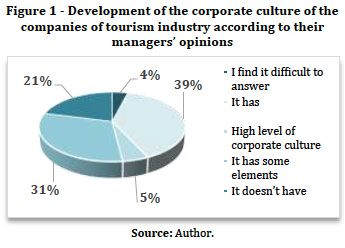
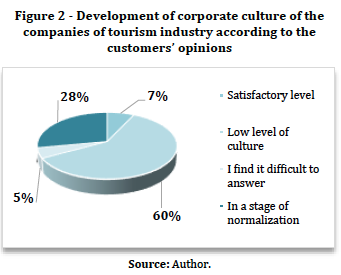
As seen on Figure 2 only 7 % of the customers inquired stated that the tourism companies have a satisfactory level of corporate culture. More than half of them reckon that it is at a low level. The data presented on Figure 1 and Figure 2 prove that the customers require a manifestation of corporate culture of tourism companies even more than the companies themselves do.
The approach for competition and competitiveness actually differentiates by interdisciplinary, especially in the sphere of tourism (Stankova, 2011). The definition of competitive power given by Bruning and Lockshin emphasizes on competitive power of the enterprise is comprised of:
- having strong and durable relationships with the buyers, suppliers and other organizations from the external environment and
- having an integrated self-adjusting system of in-company processes and teams motivated to work at a high level of quality, innovation, flexibility, intelligence, efficiency, honesty and cooperation (Bruning & Lockshin, 1995).
- having an increased interest to the introduction of quality management systems and their certification in line with international standards (Stankova & Grachka, 2013).
Based on the representations hereinabove we can state that competitive power of the companies on the tourism market is influenced not only by the price and quality of the tourism product, and the availability of a high level of corporate culture of the tourism company also plays an important part as it improves the quality of services. It is important enterprises from the tourism branch put extra efforts and resources towards the improving of online services' quality(Zlateva, 2013).
Corporate culture in general is impossible without the understanding of the mission presenting the major trends of company development. Their definition is a long-term vision of what the organizations aims at – its unique goal, distinguishing it from all the other similar organizations. (Donnelly, Gibson & Ivancevich, 1997) In fact the company mission is a concentrated manifestation of its philosophy and policy, it is proclaimed and implemented by the senior management. The mission reveals the reason for the enterprises existence, its history and trend of development on long-term basis (Kiyrova, 2012), and detailing is implemented through the development of objectives, strategies and concrete plans. (Madgerova, 2000) Obviously the clearly stated mission helps the strategic planning, but it has rather descriptive than concrete quantitative nature." (Stoilova, 2013) According to some managers the mission of the tourism industry companies is comprised of developing and supplying to customers a complete, high-quality tourism product that is studied to the tiniest details and provided with all the necessary components, that has its own individuality and is able to transform and modify the products in the course of time.
For the purposes of research the said inquiry contains questions aiming at the studies of business of the tourism companies in Bulgaria, including of the process of setting of an organizational mission. 110 directors and chief executive officers of travel agencies, hotel complexes and family hotels in South Bulgaria took part in the research. The respondents age is within the range 36-52 years. Table 1 shows the results received from the people inquired in reply to the question Does your company have a mission?
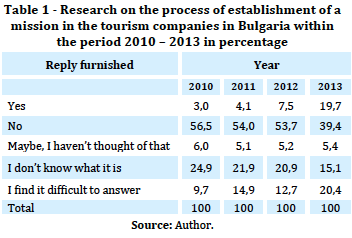
As seen from Table 1, the results received from the reply to the question Does your company have a mission? show that the biggest share (39,4 %) of respondents replied that their companies do not have a formulated mission. A great part of managers found it difficult to answer. However, in the course of the period researched a positive growth trend is observed as the number of tourism companies aware of their social significance and the need for a formulated mission is inevitably increasing. More and more managers are starting to appreciate that the structure of the mission should naturally cover the company positioning, i.e. its place and specialization in the system of market relations.
It is to be noted that the establishment of a mission is only a part of the cultural policy of a tourism company. The level of corporate culture directly reflects the conduct code as it covers rules and regulations of conduct based on the principle of the common human morality, rites and traditions of behaviour in various situations of interpersonal communications. In order to make these principles work it is not sufficient to only develop them and incorporate them into the organizational documents, they should be brought to the consciousness of every employee. In our opinion under todays conditions it is required to re-orientate the corporate culture to the human individuality, respect for individual persons and organic incorporation of ones own interests into the interests of the collective relationships system. The level of corporate culture reflects the level of a teams organizational development (presence of teams in the organization – high level of development within the collective body). A man within such a system is considered not a functionary, but a person within the broadest sense of the word.
Unification of people occurs on the basis of common values and norms, in the absence of any rules from the supreme ones, save for the common human norms and requirements. Favourable conditions are created for the development of employees initiative spirit and creative activities. The elements of calculations and benefits are not denied, which makes us state about the important team principle – optimum combination of personal and organizational interests.
4. Research on the psychological climate and motivational factors in the tourist companies in South Bulgaria
The culture of employment relations is the basic parameter of corporate culture in the tourist companies. Typical peculiarities of business relationships, duties and norms of behaviour are developed in each company. Substantiation of behavioural norms and rules is dictated by the need for change of human attitude to the object of labour. Employees professional duty in each field of activity involves the responsibility of proper attitude to work, and namely: employees have to love their job, to incessantly improve their qualifications, to respect themselves and their job.
The psychological climate within the team is of great significance for the development of the corporate culture. The results obtained from the research (see Figure 3) show that the linear managers are fully or partially satisfied with the current psychological climate. In contrast to them the department employees are unsatisfied or only partially satisfied. The psychological climate in the companies of tourism industry depends on various factors, including on the style and methods of management, on the managers personal qualities, etc. In most of the cases the manager can influence the establishment of a favourable psychological climate by setting major factors that define the order of relationships within the team. The employees of some of the researched companies of tourism interest appreciate the favourable environment as the only or major motivating factor in their work.
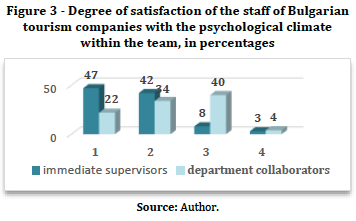
Remark: 1 – fully satisfied; 2 – partially satisfied; 3 - unsatisfied; 4 – I find it difficult to answer.
The psychological climate is based on the relationships between the management staff and the subordinates. In the assessment of manager – subordinate relationship the leadership belongs directly to the boss. A general re-orientation to the conception of democratic management is observed and the managing staffs of tourism industry enterprises have changed their outlooks with regard to the implementation of the authoritative methods of influence on their subordinates, which allows the performance of larger quantity of work than the democratic style of management does. But the relatively low level of motivation, of creativity and innovation of thinking, the strained psychological climate within the team and the aggressiveness of collaborators are the reasons due to which other styles of management are sought. Within the period 2007 – 2010 the share of co-operative style of management has increased significantly its share in tourism, and in year 2009 even got ahead of the other styles of management (Filipova, 2012).
Another element influencing the level of corporate culture is the employees awareness. Only 23% of the employees think that they are aware of the course of business of the tourism company to some extent or another. This is a very low figure. Currently the private communication models are preferred and the tradition of employees general meetings is almost abandoned. Most of the managers reckon it a remnant of tradition, regardless of the fact that 90% of the personnel feel a true regret because of its abandonment.
The most important factor determining the characteristics of the staff directly influencing the corporate culture in tourism is the national business culture. The advantages of integration, co-operations and the need for finding a compromise necessitate the interaction of people of various cultures, with various approaches of solution of problems of the same essence.
Regardless of that the representatives of various cultures are closer in their internal, moral, and ethical essence and differ mainly in external manifestations, customs, rites, clothing, etc. Development of corporate culture involves inter-cultural literacy of tourism company staff.
Motivation is among the most important aspects characterizing the values adopted by the collective body. The recognition of economic efficiency of investments in staff recruitment, maintenance of its work capacity, establishment of conditions of better implementation of personal abilities and skills are fundamental in modern conceptions of staff management in tourism. It is worth noting that the successful sales of tourism product depend on the quality characteristics of employees and on the level of their performance at work (Yaneva, 2013). Therefore, the important changes in human resource policy, the style and method of human resources management are related to the changes of the motivation system, which provides the opportunity to ensure the return to employees normal work efficiency and the establishment of new work consciousness. Employees motivation is influenced by the following:
- System of economic norms and compensations;
- Work pay level and fairness of allocation of income;
- Conditions and contents of work;
- Recognition by the part of the others and career development;
- Creative impulse and interesting work;
- Willingness for self-recognition and constant risk;
- Firm external teams / commands and internal culture, etc.
Collaborators readiness and willingness to do their job by doing their best is considered the key factor of success of the tourism company. The awareness of the motives making people work, as well as of the mechanisms of their occurrence enable the development of a personnel management system, and in particular of a talent management system of the company, which is significant for business of nowadays. In order to have efficient and sustainable management of people for a long period of time, it should be made an integral part of corporate culture at all hierarchical levels of an organization (Usheva, 2010). It is additionally essential that everyone involved in decision-making has a full understanding of what is possible, feasible and practicable in terms of organisation resources, capability, willingness and commitment (Pettinger, 2013).
For the purposes of research the inquiry conducted by the author covered questions of research of the factors of significance for the employees of tourism companies in their choice of employment. The results from the research prove that one of the major factors is the interest for work. This factor leaves behind in terms of significance factors as salary, recognition of professional and personal qualities, psychological climate in the team and the opportunity for professional development (see Table 2). The results obtained give a notion of decisive factors for the tourism companies employees and they differ significantly from the factors, which are of importance for the managing staff.
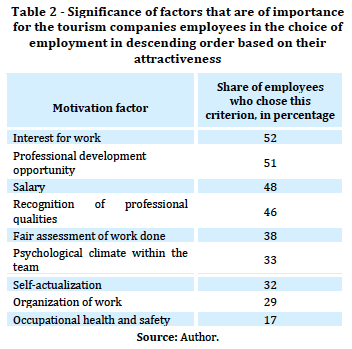
The results from the research carried out among 1000 Russian managers by the Managers Association in Russia for the identification of the factors of importance for the nowadays managers show that the greatest part of them aim at increasing their professional level and at providing financial security for their families and themselves (see Table 3). A significantly smaller part of them aim at establishing their own company or at taking the lead of some big organization. The share of the managers that deem it important to deal with science is exceptionally small.
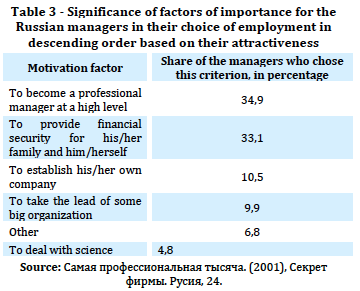
The analysis of the results from the research is presented in Table 1 and Table 2 and brings to the following conclusions:
- The financial stimulation is not the only or universal means of employees motivation;
- Fear as a motivation factor is aimed at the poorly qualified employees and is typical for the authoritative style of management;
- Efficiency of motivation depends on finding the correct balance of stimulation, remuneration and punishment.
5. Conclusions
Each employees professional role within the tourist company is related to the performance of ethical norms, rules of conduct and relationships with colleagues, subordinates, customers and partners. The observance of ethics in business relations is the fundamental criterion of assessment of the level of development of corporate culture in tourism. We believe that it is expedient to pay a special attention to the establishment of general organizational standards of behaviour in tourism, as a major component of corporate culture. The ethical requirements are reflected by the rules of in-company regulations on employment legislation, by job instructions and contracts. The procedure for the preparation of ethical requirements will certainly cause some difficulties, but the process to the achievement of uniform understanding and interpreting of the norms of behaviour and their usefulness and the need for the improvement of the level of corporate culture in tourism is even more complex and complicated.
Corporate culture is defined as an aggregate of values and beliefs defining the norms of employees behaviour and the character of the organizations vital functions. The behaviour of the employees of a tourism company is being developed within the corporate culture established, which is a basis of integration and coordination of staffs efforts in the organization.
Corporate culture forms the model of behaviour in employees by creating a sense of belonging to a corporate family. Such behaviour is implemented through the establishment of correspondence between the employees notions of their roles and the place within the organization structure and opportunities provided by the organization. The norms of corporate culture are directly reflected in the overall business of the tourism company and influence the quality of the tourism product and services offered. From this point of view corporate culture is the parameter, which more than all the other parameters characterizes the tourism company and the potential for the improvement of its competitive power.
References
Самая профессиональная тысяча (2001). Секрет фирмы, 20 - 28.
Atanasova, А. (2012). European Union policy in the establishment and development of clusters and its reflection in Bulgaria. Proceedings of the Entrepreneurship and economy symposium of research articles, Blagoevgrad: South-West University "Neofit Rilski", 54-65. [ Links ]
Atanasova, А. (2010). Fundamental issues of cluster development in Bulgaria. Proceedings of the Entrepreneurship and cluster development symposium of research articles, Blagoevgrad: South-West University "Neofit Rilski", 74-80. [ Links ]
Bruning, E. & Lockshin, L. (1995). Fundamental Elements in the Definition of the Organizational Competitiveness. Gestion 2000, 11(3), 55-70. [ Links ]
Costa, J. & Bogdány, E. (2013). The relationship between organizational culture and the transfer of management, functions and roles in the SMES succession: A case study between Hungary and North of Portugal. Tourism & Management Studies, 9(1), 121-128. [ Links ]
Dimitrova, R. (2013). Opportunities of marketing research for increasing competitiveness of the cultural tourism product. [ Links ] Paper presented at the International Scientific Conference Cultural Corridor via Diagonals – Cultural Tourism without Boundaries, Sofia, Bulgaria.
Donnelly, J., Gibson J., & J. Ivancevich, (1997). Fundamentals of Management. Richard D Irwin (Open Library). [ Links ]
Filipova, M. (2012). Interaction between management style and corporate culture in tourism. Book of Proceedings of the TMS Tourism & Management Studies International Conference Algarve 2012, vol. 2, 587-593. Olhão: University of the Algarve. [ Links ]
Kiyrova, V. (2012). Marketing plan. Organization and Management of the Small Business. Blagoevgrad: SWU Press. [ Links ]
Kyurova, V. (2013). Marketing research of consumer behavior in tourism. [ Links ] Paper presented at the International scientific conference Cultural corridor via diagonals – cultural tourism without boundaries, Sofia, Bulgaria.
Madgerova, R. (2000). Business Planning of the Small and Medium Enterprises. Blagoevgrad: SWU Press. [ Links ]
Paleshutski, K. (1999). Management of small and big companies. Blagoevgrad: SWU Press. [ Links ]
Pettinger, R. (2013). Strategy, investment, behaviour and results. Tourism & Management Studies, 9(1), 49-57. [ Links ]
Rühli, E. (1991). Unternehmengskultur- Konzepte und Methoden. Kulturmanagement in schweizarischen Industrieunternehmungen. Bern: Haupt Verlag. [ Links ]
Stankova, M. (2011). Assessment Management and Analysis of a Tourism Destination. International Journal of Contemporary Economics and Administrative Sciences, 1(1), 65-77. [ Links ]
Stankova M. & Grachka, L. (2013). Enhancing tourism competitiveness through optimization. Proceedings of the Improving the Competitiveness of Enterprises and National Economies - problems, factors, determinants, strategies and solutions thematic collection of readings of international significance, Niš: University of Niš, 49-74. [ Links ]
Stankova, M. (2014). Challenges ahead for Bulgarians competitiveness as a mountain tourism destination. Tourism & Management Studies, 10(Special Issue), 180-185. [ Links ]
Stoilova, D. (2013). Financial Management. Blagoevgrad: BON Publishing House. [ Links ]
Yaneva, D. (2013). Opportunities to reduce the impact of seasonality upon the hotel business employment. Unpublished doctoral dissertation, South-West University "Neofit Rilski", Bulgaria. [ Links ]
Usheva, M. (2010). Talent Management. Blagoevgrad: SWU Press. [ Links ]
Zlateva, D. (2013). Activating the Consumer Behavior on the Internet. [ Links ] Paper presented at the International Scientific Conference Cultural Corridor via Diagonals – Cultural Tourism without Boundaries, Sofia, Bulgaria.
Article history:
Received: 14 May 2014
Accepted: 23 November 2014














